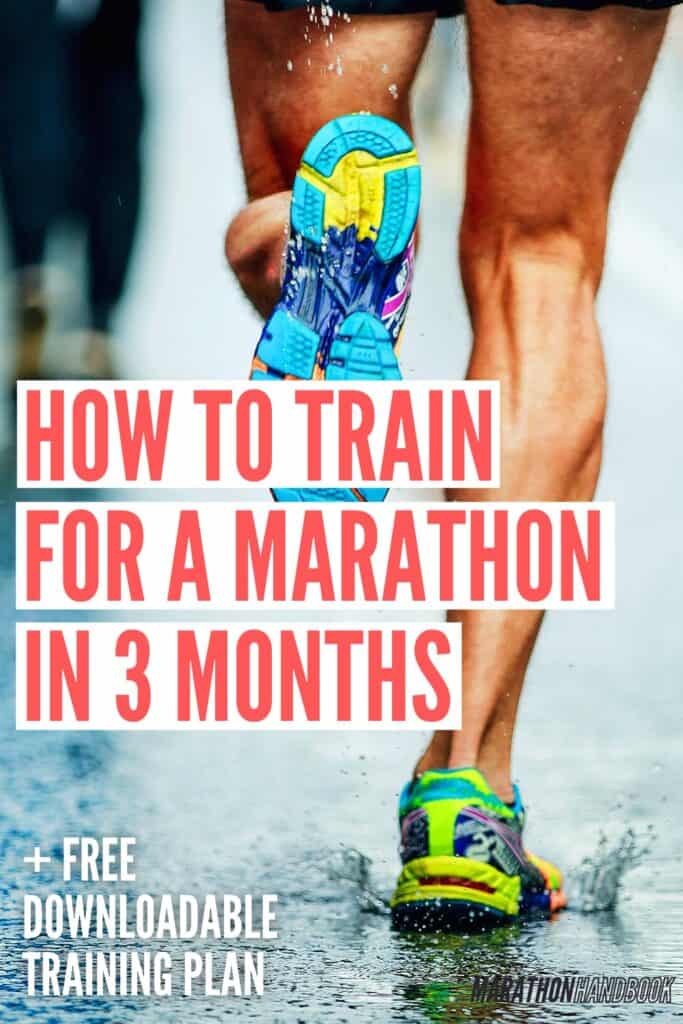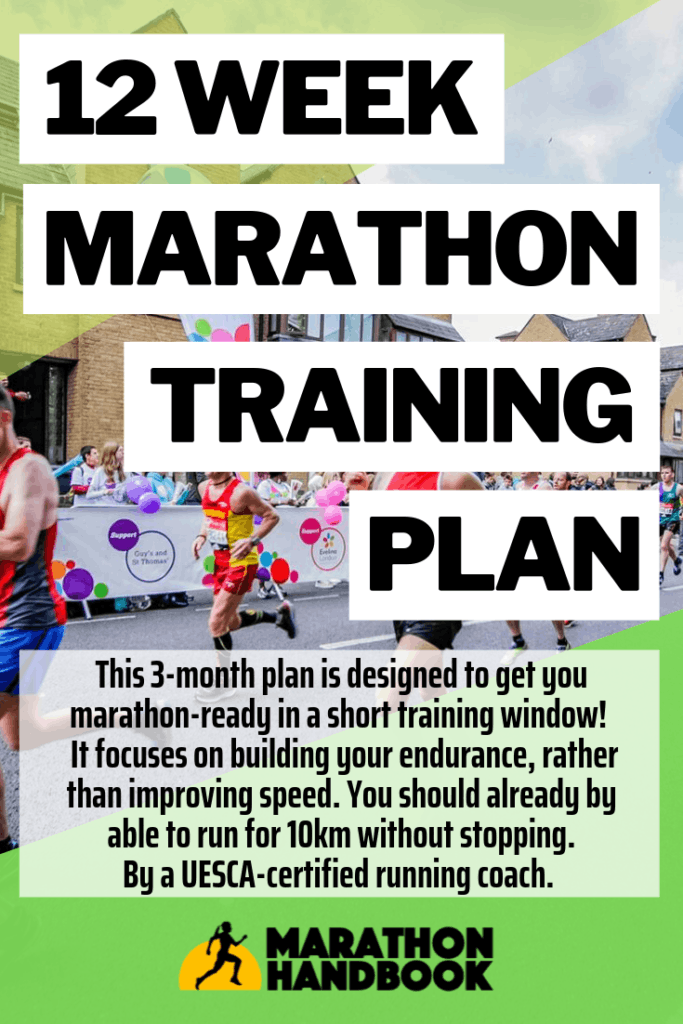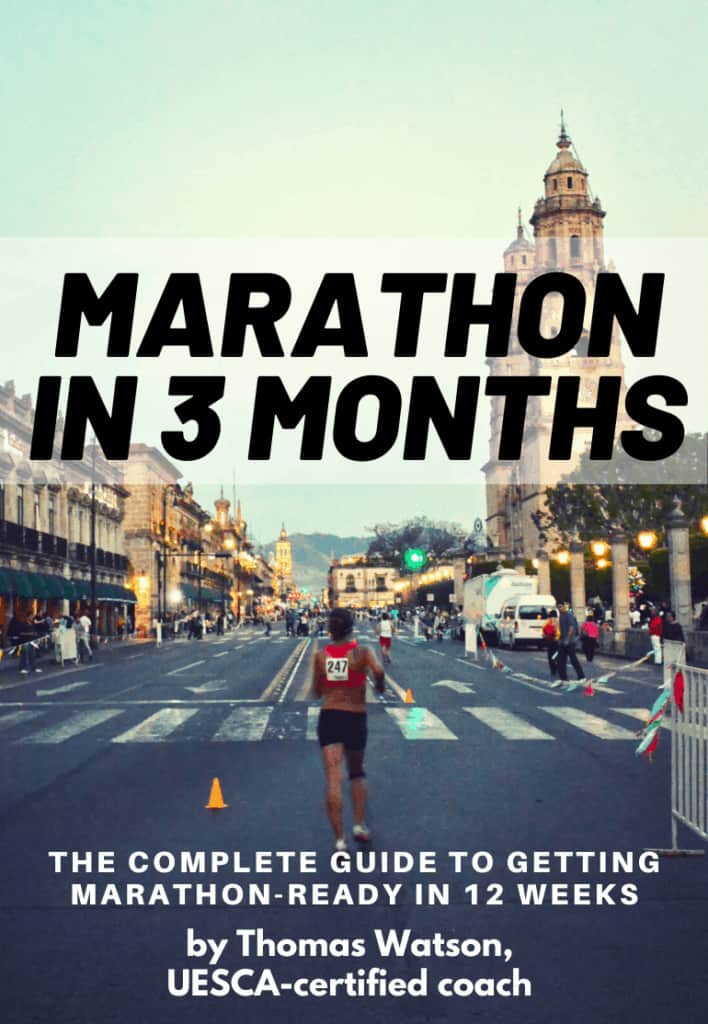In this post, I’m going to outline a training method for getting marathon ready in 3 months – and share my 3 month marathon training plan.
When runners ask “How long does it take to train for a marathon?”, generally the minimum I’d recommend – depending on the runner’s background – is 12 weeks, or 3 months.
If you’re not in a hurry, better to spend 4 – 6 months getting ready for your marathon.
Marathon training is a huge undertaking – you’ve got to get your body used to running continuously for hours on end.
This means you’ve got to build your endurance, your muscular system up, your cardio system, and your system.
In this article, I discuss . . .
- what your running fitness level should be like before committing to a marathon in 3 months;
- how to train smart: which workouts to prioritise, which to ditch;
- how to avoid injury and what your training and race day strategies should be;
- why mixing running and walking is likely to help you on race day!
Ready?
Let’s jump in!

How To Train For A Marathon In 3 Months
As a running coach, I would typically recommend that runners take 4 – 6 months to prepare for a marathon – especially if it’s your first.
This gives you time to gradually build up your endurance and running game, in a sensible way which minimizes the risk of burn-out, overtraining or injury.
(Got more than 3 months to get marathon-ready? Check out some of my other Marathon Training Plans, which vary from 4 to 6 months in length!)
But the truth is that lots of runners turn up to a marathon having done a lot less than this – and most of them make it round those 26.2 miles.
That’s right – I said most of them.
The less training and preparation you do, the more likely you are to not finish your marathon.
I should know, early in my running career I had a few hit-and-miss marathon experiences.
In fact, for my first-ever marathon I turned up at the start line with only 3 months of specific training.
On the day, I was strong until around the 35km mark, then hit the wall in extraordinary style, and managed to pull my feet over the finish line.
But as soon as I stopped running, I was limping. For the next few days, I could barely get up and down the stairs.
I made a lot of mistakes in my training . . . mistakes I see rookie marathon runners make time-and-time again.
That’s why I’ve created this post. I wanted to make the most comprehensive, bulletproof guide to running a marathon in 3 months of training.
I want to show how you can maximize your probability of success on marathon day.

Can I Complete A Marathon With Under Three Months Preparation?
There are three factors that will influence your chances of successfully completing a marathon with only three months of preparation:
1. Starting Fitness Level
Are you already fit?
Could you go out and comfortably run a 10k tonight?
If you’ve already got a baseline of cardiovascular fitness, this is a massive advantage. Especially if you can already run.
Your biomechanics are already familiar with the process of running, and now it’s just a case of building up that base – rapidly.
But if you aren’t currently doing any kind of cardiovascular exercise, then you’re giving yourself a mountain to climb.
If you can’t currently complete 10k at your target marathon pace (which may be a mixture of walking and running), my frank advice would be to pick a more attainable running goal, such as a 5/10k or half marathon.
If you’re unsure of how prepared your body is, check out our training plan below – jump in with the first week and see if you can keep up!

2. Follow a Structured Training Plan
Getting marathon-ready in three months means you’re going to have a busy, and rigid, training schedule.
This means you need to be disciplined – and have the right plan in place before you start.
A lot of runners waste time by training ineffectively, or by over-training and logging junk miles – miles which don’t move the needle on your marathon readiness.
Many first-time marathon runners actually run too far in their long runs (or too fast), thinking that they need to prove to themselves that they are capable of the distance before running the marathon. This approach often leads to injury and over-training fatigue.
The trick is to train smart. Build towards your goal in a structured, methodological way.
The training plan I’ve shared below does the following:
- Ditching any speed work. With only 3 months to get ready, you shouldn’t be worried too much about your pace. Adding in speed work (such as interval training) is good if you have plenty of time to train and want to improve your running speed, but when you’ve only got 12 weeks to get ready, simply working on your endurance will be intense enough – adding in an intense speed workout is gonna push you to your limits. Leave the speed work behind, it’ll leave you exhausted without time to recover.
- Stick to a reasonable exertion level – keep it comfortable. For those mid-week training runs, stick to a conversational pace. For the weekly long runs, dial it down even further – just focus on getting those miles in, even if it means taking regular walking breaks. Stick to an RPE of about 2 out of 10 for your long runs!
- Take step-back weeks. Every 4 weeks or so, you want to have a training week where your mileage does not increase. These step-back weeks give your body a chance to consolidate the gains it’s made in the prior weeks, instead of constantly pushing those endurance limits.
- Balancing training mileage vs. risk of injury / burn-out. The crux of a good marathon training plan is its ability to stretch your limits, without going too far and causing injury or burnout. While the training plan I’ve shared below should be a good guide for this, you have to learn to listen to your body and know when you’re pushing too hard – or when you could go harder.

3. Injury Prevention
This is a big one. With only 12 weeks to prepare and a steep increase in your mileage, injuries aren’t just possible. They’re likely, and almost inevitable if you’re not much of a runner already.
There’s a good chance you’re going to develop an injury so severe that it prevents you from running the race. So how do you mitigate against injuries during an intense training schedule?
- Warm up and cool down. Warm-up before each run by walking briskly. Do the same at the end of the run, cooling down gently. Stretching after a run helps too.
- Address injuries immediately. If you do feel an injury coming on, don’t run through it – if it’s a potentially bad running injury, this will only make it worse. Instead, address the issue immediately. Research what could have caused the pain and look at ways to mitigate it – using kinsio tape, supports or by going to see a sports therapist if in doubt.
- Recovery time. You’ve got to be smart about your training, and this means giving your legs time to recover between runs. If you begin to feel that your legs are constantly tired, or the onset of an injury, then it’s time to skip a training session and give your legs a break. But instead of wasting that time, why not do some active recovery – such as go to the pool instead? Swimming is great low-intensity exercise that can help massage tired muscles.
- It’s not cheap, but going for a dedicated sports massage can do wonders to tired legs. All those worn knots and internal scars get worked out – though it can leave you stiff for a couple of days.

Is it OK to Walk During My Marathon?
Absolutely!
In fact, if you are not confident about your ability to run the whole 26.2 miles, then it’s better to build walking into your training – and marathon strategy – rather than wait until you’re too pooped to run any further before you start running.
How do you incorporate walking into a long run or marathon?
The best way is to do a structured run/walk marathon strategy like Jeff Galloway’s Magic Mile method, or similar.
Essentially, you run a mile at a comfortable pace, then walk for 30 seconds to recover. Then repeat, over and over – that’s the run walk method!
Don’t wait until you’re beaten up before you start taking walking breaks – have a structure and take them early and often to become a sustainable runner!

How To Train For A Marathon In 3 Months
1. Focus on Running (With a Little Strength Training)
Given you’re on an accelerated training schedule, anything that’s not running should be considered optional, and potentially discarded because it eats into your running time. The only exception I’d recommend is some strength training if you can fit it in.
Related: Guide To Weightlifting For Runners
Follow my 12 week training plan, included below, with 3 runs through the week and a long, slow one at weekends.
2. Pace Is Not Important
With only 12 weeks to prepare, you don’t have the time to build up the stamina required to complete the marathon at a competitive, sustained pace.
Your goal on race day should be to simply complete the miles, not to give Gebrselassie a run for his money.
Instead, focus on training to a sustainable pace.
Think of it as a ‘conversational’ pace – one you can hold a conversation while running.
After all, your goal is just to finish – not break any records.
Running at an unnecessarily fast pace increases the risk of injury, and creates further micro-tears in your leg muscles – which will increase your recovery time.

3. The Taper
The marathon taper period is the wind-down in your training in the weeks leading up to your marathon.
Given you only have 12 weeks total to train, you want to maximize your training potential while allowing your body enough time to taper.
This means rest, recuperate, and get ‘race ready’. In the training plan below, I have left the tapering period at 3 weeks.
This means that you have 9 weeks of building mileage ahead of you.
4. The Longest Long Run
Every weekend you should be going out for a long, slow run at a comfortable pace – with walking breaks if you need them.
Each run gets progressively longer, improving your endurance (with the exception of step-back weeks, where your mileage is intentionally not increased in order to help your body consolidate the gains it’s made)
My recommended maximum long run length for the Marathon In 3 Months programme is 21 miles, or 34km.
Why?
Although this is leaving 5 miles / 8km on the table come marathon day, this distance is actually standard practice across marathon training plans through the coaching world.
It’s a trade-off between increasing your training volume, ensuring you’re getting enough miles, and not pushing you too hard.
You might be surprised to learn that practically no marathon training plan includes runs of 22 miles or over.

5. Learn How To Fuel
Learning how to fuel your long runs is a technique often overlooked by rookie marathon runners.
We build up our cardiovascular strength and leg muscles to carry us 26.2 miles, but we don’t learn how to actually supply our bodies with the fuel required to get us around the route.
Our bodies rely mainly on carbohydrates when we run.
Typically, our carbohydrate stores can keep us going for anything from 45 minutes to 2 hours (for those who are well trained).
However, anything longer than that and we struggle.
Our bodies begin burning fat for fuel – which isn’t normally an efficient process – so we suddenly feel terrible.
We bonk, or Hit The Wall.
We want to stop, we have no energy left, and every step forward requires an impossible burst of willpower.
That’s why it’s essential to fuel as you run once you begin training in longer distances.
Experiment with different types of sports nutrition – energy gels being a popular choice – and fuel often.
I typically take a gel every 30-45 minutes during a race.
If you’re not a fan of gels, seek out the alternatives available – nut butters, snack bars, trail mix, sports drinks – whatever works for you!
However, don’t leave it until race day to see if you like them – try them out in training.
Many people can’t stomach gels, and these can lead to tummy issues during the race.
6. The Dry Run
Don’t forget to do a ‘dry run’ before your marathon.
This means going for a long run with all the gear you plan to wear on the day, along with equipment, food, drink, etc.
If you can, try and find a surface that is similar to that of the race, and run at the same time of day to simulate race conditions.

The Marathon – What You Should Expect
My advice is to be humble, don’t go out too fast, set realistic goals, and enjoy your run!
A suitable realistic goal is simply to finish, or to run the whole course.
The fact that you’ve only had 3 months to train means that you shouldn’t worry about the time it takes you to complete the 26.2 miles – the fact that you’re finishing a marathon at all is a great feat.
If you do start to suffer, it will be in the second half of the marathon. It can be tempting to try and push through any pain and discomfort and continue running, but often taking a strategic walking break can help you re-compose yourself and finish stronger and happier.
If you’re lucky, or have a good running base already, perhaps you’ll sail through the whole race.
But prepare yourself for discomfort, just in case.
Expect tired, heavy legs.
Expect tired everything.
Just the act of moving your body forward will require serious willpower.
If it gets to the stage where a specific part of your body is painful, then as always – stop and walk.
If you run through a potential injury, all you’re doing is increasing the chances of it flaring up more.
In a marathon, don’t forget that the finish line is never that far away – you can always walk to the end, even if it means finishing a lot later than you anticipated.
Even if you have to walk the last 10km, it might take you 2hrs to complete them . . . but after those two hours, you can tell everybody that you completed a marathon!
Marathon In 3 Months – The Training Plan
The 12 Week Marathon Training Plan
This plan has you working out five days a week – four days of running and a day of cross-training, with two days off.
Given the short training time, the important thing to focus on building your stamina and endurance rather than speed.
There are 3 regular training runs per week, and a long run at the weekends. For your Long Runs, the aim is simply to get your body used to running for a long time – so take them easy, don’t push yourself. For your weekday runs, try and sustain a pace at which you could hold a conversation with someone.
Click here to visit the training plan page, or enter your details below to get sent the free PDF + Google Sheets / MS Excel version of this plan!
Training Runs Explained
There are 3 regular training runs per week, and a long run at the weekends.
For your Long Runs, the aim is simply to get your body used to running for a long time – so take them easy, don’t push yourself. Forget
For your weekday training runs, try and sustain a pace at which you could hold a conversation with someone. So not super easy, but not uncomfortable either.
The plan also features one day of cross training!
Cross training is a great way to keep fit and ensure your marathon training does not negatively impact other parts of your body.
Many runners have other sports and hobbies they don’t like to neglect when in training, so you can do these on Thursdays if you want. Cycling, swimming and yoga are all recommended cross-training activities.
Don’t overdo things – given you only have 12 weeks to prepare, speed is secondary to getting the miles in. If your body is worn out, allow it some rest. And good luck.
Marathon In 3 Months – The Book
Enjoying this post?
Delve deeper into the 3 Month Marathon Training philosophy with a copy of my book: Marathon in 3 Months.
It includes over 100 pages of in-depth info on training, strategy, pace, gear, nutrition, and more.















I have exactly 3 months to train for my first marathon. Always said I would never do a marathon, then a year ago I skipped right over a marathon and ran a 50K! With just one months training time before hand. I had been feeling really good in my running and for some reason thought a 50K would be easier than a marathon. I think because the idea is to just finish, not push and walking and eating was encouraged. So my training consisted of 8 mile runs most every day for a month. I wanted to try to increase the mileage but felt that I would probably have a better chance of injuring myself. So I just ran what I could, sometimes a double run in one day. I have to say I did fairly well in the 50K. I ran with a friend that insisted on walking a bit at each water stop which was about every 5-6 miles. I didn’t feel the need but did anyway because initially my goal was to finish. I’m a bit competitive tho, so as the miles racked up, I kept a decent pace, one where I could still comfortably talk. My friend fell behind. I was surprised to still be feeling good at mile 20, even strong and had this feeling I could race this thing out. LOL I still kept a decent pace to mile 26 and figure I ran about a 4 hr 18 minute marathon at that point. That was with several walks. The wall came after that. The last 5 miles took forever tho I still ended up 1st in my age group, which is 50-59, I’m 59. Anyway…..I feel like I have a chance to qualify for Boston and I feel like if I don’t do it now, then when? So I read your training plan and I’m considering doing a similar plan but not quite such long runs near the end. Do you think I can still run and qualify without pushing the mileage. I run about 35-40 a week on average, just finish a 15K a couple weeks ago and did a 5K and 7 miles in a relay this last weekend. The marathon is the end of August and I feel like I have plenty of time considering I only had a month before the 50K. Up until the 50K I did do a year of half marathons in 2016 but since then my races haven’t been longer than a 15K or 7 miler. Just thought I could get some good advice.
Thanks!
Brenda,
drop me an email and we can get into the details!
Thomas
Hi Thomas,
Thanks for the info.
I am running a marathon on the 5th of March 2022 (Hemel en Aarde 42.2km in Hermanus South Africa) the route is quite strenuous with lots of uphill’s and downhills.
I am 62 years of age, fairly fit ( 5km Time trail in 28 min 46 sec, fairly flat) and do at least 22km of single track MTB, varying from grade Green to Black once per week.
I am actually planning to run the Comrades marathon (92km) on 28 August 2022, this being one of my “Bucket list” items.
I believe that the RPE method that you are suggesting will suit me well, in order to train for the 42,2 km marathon?
As for now, my plan is as follows:
Monday: 5.5 km easy (+- 37min)
Tuesday: 5.5 km as above.
Wednesday: Rest day
Thursday: 5km or 8km Time trail with the club.
Friday: 20km MTB (not to hard)
Saturday: 5km Park run or 16-22km slow long run with the club.
Sunday: Rest day.
Please comment on the above.
Best of regards
Gerald.
Gerald, looks solid – you’ll want to start weekly long runs soon, and remember to do some of your training runs on hills!
I ran a 1.35 half marathon a few years ago – started running again just over a month ago and building up my mileage now, just signed up to a Marathon in September just over 3 months away and my ambitious goal is to run a sub 3 marathon – I know I’ve got the pace for it (got a sub 19, 5k in my locker) so I’m gonna give it a shot and qualify for Boston
Gerald, I am signed up for my first marathon in November. NYC. I have been base training since Feb but suffered an injury in the begining of June. Post Tibial Tendonitis. If I can get back to running by August I will have three months to train. When I got injured I was running 6 miles as my long run and I think I can jump back into that as long as my leg is okay. Do you think the marathon is doable after such an injury (yes I am seeing a doc but just curious from a runners point of view). I had already planned on the run/walk method and feeling a lot of discomfort afterwards anyway! Lol. Thanks for the advice. Liz